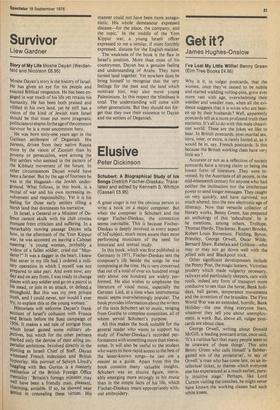Survivor
Llew Gardner
Story of My Life Moshe Dayan (Weidenfeld and Nicolson £6.95) Moshe Dayan's story is the history of Israel. He has given an eye for his people and exacted Biblical vengeance. He has been engaged in war much of his life yet retains his humanity. He has been both praised and Vilified in his own land, yet he still has a vision of the kind of Jewish state Israel Should be that must put more pragmatic Politicians to shame.ln the age of the common survivor he is a most uncommon hero.
He was born sixty-one years ago in the Galilean settlement of Deganiah. His Parents, driven from their native Russia more by the vision of Zionism than by Poverty or persecution, were among the first settlers who assisted in the pattern of the Kibbutz movement of the future. In Other circumstances Dayan would have been a farmer. But by the age of fourteen he was in the Haganah—the Jewish underground. What follows, in this book, is a recital of war and his own increasing in.volvement and responsibility. Yet it is his feeling for those early settlers tilling a harsh land that dominates his narrative.
In Israel, a General or a Minister of Defence cannot skulk with his club cronies immune from criticism and suffering. In a remarkably moving passage Dayan tells how, in the aftermath of the Yom Kippur war, he was accosted on leaving a Cabinet meeting: 'a young woman, probably a Widow of a fallen soldier, cried out "Murderer!" It was a dagger in the heart. I knew that never in my life had I ordered a military operation in which 1 myself was not Prepared to take part. And even now, any day and on any front, I was ready to change Places with any soldier and go on a patrol in his stead, or join in an attack, or defend a stronghold. But this was my own private truth, and I could never, nor would I ever try, to explain this to the young woman.'
Historians will welcome Dayan's frank account of Israel's collusion with France and Britain before the Suez campaign of 1956. It makes a sad tale of intrigue from Which Israel gained some military objectives, but which for the other partners marked only the demise of their ailing imperialist ambitions. Involved directly in the Plotting as Israeli Chief of Staff, Dayan witnessed French indecision and British hypocrisy, His portrait of Selwyn Lloyd's haggling with Ben Gurion is a masterly realisation of the British Foreign Office Mentality: 'Britain's foreign minister may Well have been a friendly man, pleasant, Charming, amiable. If so, he showed near genius in concealing these virtues. His
manner could not have been more antagonistic. His whole demeanour expressed distaste—for the place, the company, and the topic.' In the middle of the Yom Kippur war, a young Israeli officer expressed to me a similar, if more forcibly expressed, distaste for the English malaise.
The weakness of the book is the flaw in Israel's position. More than most of his countrymen, Dayan has a genuine feeling and understanding of Arabs. They have turned land together. Yet nowhere does he bring himself to recognise that the very feelings for the past and the land which motivate him, may also move young Palestinians. In this respect the blindness is total. The understanding will come with other generations. But they should not forget that they owe their existence to Dayan and the settlers of Deganiah.





































 Previous page
Previous page